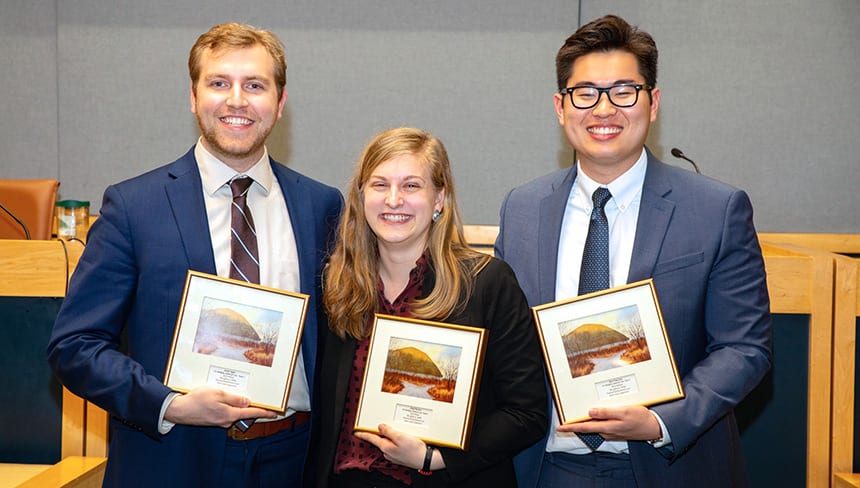
By Andrew Cohen
Diligent preparation and stellar oration led to major jubilation for three Berkeley Law students who recently won the Jeffrey G. Miller National Environmental Law Moot Court Competition.
2Ls Jarrod Ingles, Abigail Burman, and Ryan Yang Sun bested 55 other teams in the prestigious event—the largest interschool moot court of any kind held under one roof—at Pace University’s Elisabeth Haub School of Law in White Plains, New York.
The competition demands complex legal analysis of thorny environmental issues presented in a mock problem. Participants research and scrutinize the issues before writing persuasive arguments for one party that advocates how those issues should be resolved. They then conduct oral argument for all three parties.
Berkeley Law’s team received valuable guidance from coach and Earthjustice attorney Marie Logan, Professor Holly Doremus ’91, third-year student Candice Youngblood (who competed in last year’s competition), and others.
“We remained flexible to changing our arguments each time we received feedback,” says Ingles, one of two competitors to receive Best Oralist runner-up honors at the event. “We carried this flexibility into the competition, where we changed our prepared arguments between each round based on feedback from the judges and our own realization of where our arguments needed work.”
Ingles and Burman joined Berkeley Law’s Board of Advocates (a student organization comprised of students who are selected for the external competition teams) this school year, and the Miller event was Burman’s first-ever competition. Sun participated in the Board’s mock trial program as a 1L and competed at the American Association for Justice Student Trial Advocacy Competition Regionals.
Long road to glory
The talented trio began working on their brief, which went through three major revisions over an eight-week period, in the first week of October. During that period, they averaged about 10 hours a week of researching, writing, and revising.
Over winter break, the students crafted a bench memo and began reading briefs submitted by other teams. In the spring, they spent six weeks focused on oral arguments, with tri-weekly practice sessions that lasted three hours each. “Enough time to argue all sides, receive feedback from our volunteer judges, and revise our arguments accordingly,” Ingles says.
This year’s problem was a climate change litigation case with three parties. The individual plaintiffs, both foreign and domestic, lived on islands that were being damaged by rising sea levels and other effects of global warming.
The foreign plaintiff was suing “HexonGlobal,” formed by a merger of all domestic oil producers and sellers, under the Alien Tort Statute. The domestic plaintiff was suing the United States for failing to protect the global climate ecosystem under the Fifth Amendment’s Due Process Clause. Berkeley Law’s team wrote its brief for the United States, but argued all three sides at the competition.
“The most challenging part was just staying focused across so many months of prep and then days of competition,” Burman says. “The most rewarding part was getting to know my teammates and our fantastic coaches.”
Divide and conquer
While writing the brief, Ingles, Burman, and Sun team split up responsibilities based on the six issues that the problem presented, and accepted their teammates’ revisions—including deletions of entire paragraphs—without question.
“For oral argument, we largely divided the roles up by arguing for the sides and issues we were most familiar with,” Sun explains. “That was a little harder though, because it required us to familiarize ourselves with the arguments we’d had been briefing against. By the end of the tournament, I’d say all three of us had a pretty good understanding of every side of every issue.”
Team members made sure that “we never boxed ourselves into just the issues we were individually arguing,” Ingles says. “Rather, we leaned on each other to help develop the strongest arguments. We never had to worry about whether any members of the team weren’t doing their best.”
Exhibit A: Even though Burman only argued issues related to the Alien Tort Statute, she came up with a powerful due process argument that worked extremely well in the final round.
This summer, Ingles will work at Wilmer Hale in Washington, D.C., Burman at the New York City Law Department, and Sun at Vinson & Elkins in Houston.